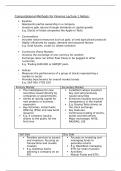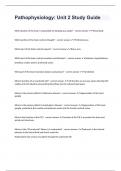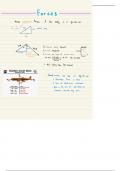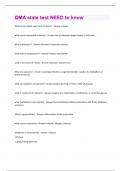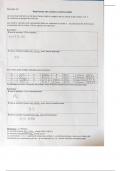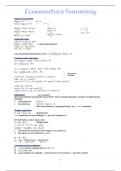0HV10 – Introduction to Psychology & Technology
Contents
Chapter 1: Introduction to psychology............................................................................................................................................................................................................. 2
1.1 What is psychology?.....................................................................................................2
1.2 History of psychology....................................................................................................2
1.3 Contemporary psychology............................................................................................2
1.4 Careers in psychology...................................................................................................3
Key terms:........................................................................................................................... 3
Lecture 1 – Introduction.................................................................................................................................................................................................................................. 4
Chapter 2: Psychological research................................................................................................................................................................................................................. 6
2.1 Why is research important?..........................................................................................6
2.2 Approaches to research................................................................................................6
2.3 Analyzing findings......................................................................................................... 6
2.4 Ethics............................................................................................................................ 7
Key terms............................................................................................................................ 7
Lecture 2 –................................................................................................................................................................................................................................................... 10
Chapter 3: Biopsychology............................................................................................................................................................................................................................. 13
3.1 Human genetics.......................................................................................................... 13
3.2 Cells of the nervous system........................................................................................13
3.3 Parts of the nervous system........................................................................................14
3.4 The brain and the spinal cord......................................................................................15
3.5 The endocrine system.................................................................................................15
Key terms.......................................................................................................................... 15
Lecture 3 -.................................................................................................................................................................................................................................................... 20
Chapter 4: States of consciousness.............................................................................................................................................................................................................. 23
4.1 What is consciousness?..............................................................................................23
4.2 Sleep and why we sleep.............................................................................................23
4.3 Stages of sleep........................................................................................................... 23
4.4 Sleep problems and disorders.....................................................................................23
4.5 Substances use and abuse.........................................................................................23
4.6 Other states of consciousness....................................................................................23
Key terms.......................................................................................................................... 23
Lecture 4 –................................................................................................................................................................................................................................................... 24
Chapter 5: Sensation and perception............................................................................................................................................................................................................ 25
5.1 Sensation versus perception.......................................................................................25
5.2 Waves and wavelengths.............................................................................................25
5.3 Vision.......................................................................................................................... 25
5.4 Hearing....................................................................................................................... 25
5.5 The other senses........................................................................................................ 26
1
, 5.6 Gestalt principles of perception...................................................................................26
Key terms.......................................................................................................................... 26
Lecture 5 – Sensory processes.................................................................................................................................................................................................................... 27
Chapter 6: Learning...................................................................................................................................................................................................................................... 30
6.1 What is learning.......................................................................................................... 30
6.2 Classical conditioning..................................................................................................30
6.3 Operant conditioning...................................................................................................30
6.4 Observational learning (modelling)..............................................................................30
Key terms.......................................................................................................................... 30
Lecture 6 – What is learning......................................................................................................................................................................................................................... 32
Chapter 1: Introduction to psychology
1.1 What is psychology?
Psychology: the scientific study of the mind and behaviour
1.2 History of psychology
Wundt and James helped creating psychology as a distinct scientific discipline.
Wundt structuralist = believe that our cognitive experience is best understand by
breaking experience intro components, accomplished by introspection
William James (1st American psychologist) functionalism = how mental activities served
as adaptive responses to an organism’s environment.
Sigmund Freud: understanding the unconscious mind is critical to understand conscious
behaviour. Relied on dream analysis, slips of the tongue and free association means to
access the unconscious. (Psychoanalysis)
Gestalt psychology = takes an holistic view of an individual and his experiences.
(Influential in study of sensation and perception)
Behaviourism = focused on making psychology an objective science by studying overt
behaviour and deemphasizing the importance of unobservable mental processes. (John
Watson + B. F. Skinner understanding principles of operant conditioning.
Humanism (reaction on behaviourism and psychoanalysis) focusses on the potential of
all people for good (Maslow + Rogers)
Cognitive revolution: people came to realize that cognition was crucial to true appreciation
and understanding behaviour.
1.3 Contemporary psychology
Psychology is made up of several subdivisions:
- Biological psychology: study of biological bases of behaviour
- Sensation and perception: how information from our sensory modalities is received
- Cognitive psychology: relationship that exist between thought and behaviour
- Developmental psychologists: study physical and cognitive changes that occur
through one’s lifespan
- Personality psychology: an individuals’ unique patterns of behaviour, thought and
emotion
- Industrial and organizational psychology (I-O settings)
2
, - Health psychology: ways to help people live healthier lives
- Clinical psychology: diagnosis and treatment of psychological disorders and other
problematic behavioural patterns
- Sport and exercise psychologists: interaction between thoughts, emotions, and
physical performance in sports, exercises and other activities
- Forensic psychologists: activities related to psychology in association with the justice
system
1.4 Careers in psychology
Options with a doctoral degree or with a master’s degree in psychology
Key terms:
APA (American psychological association): organization representing psychologists in
the United Stated
Behaviourism: focus on observing an controlling behaviour
Biopsychology: study on how biology influences behaviour
Biopsychosocial model: perspective that asserts that biology, psychology, and social
factors interact to determine an individual’s health
Clinical psychology: area of psychology that focuses on the diagnoses and treatment of
psychological disorders
Cognitive psychology: study of cognitions, or thoughts, and their relationship to
experiences and actions
Counselling psychology: area of psychology that focuses on improving emotional, social,
vocational, and aspects of the lives of psychologically healthy individuals
Developmental psychology: scientific study of development across a lifespan
Dissertation: long research paper about research that was conducted as a part of the
candidate’s doctoral training
Empirical method: method for acquiring knowledge based on observation, including
experimentation, rather than a method based only on forms of logical argument or previous
authorities
Forensic psychology: area of psychology that applies the science and practice of
psychology to issues within and related to the justice system
Humanism: perspective within psychology that emphasizes the potential for good that is
innate to all humans
Introspection: process by which someone examines their own conscious experience in an
attempt to break it into its component parts
Ology: suffix that denotes “scientific study of”
Personality: psychology study of patterns of thoughts and behaviours that make each
individual unique personality trait consistent pattern of thought and behaviour
PhD (doctor of philosophy): doctoral degree conferred in many disciplinary perspectives
housed in a traditional college of liberal arts and sciences
3
, Postdoctoral training program: allows young scientists to further develop their research
programs and broaden their research skills under the supervision of other professionals in
the field
Psychoanalytic theory: focus on the role of the unconscious in affecting conscious
behaviour
Psychology: scientific study of the mind and behavior
PsyD (doctor of psychology): doctoral degree that places less emphasis on research-
oriented skills and focuses more on application of psychological principles in the clinical
context
Sport and exercise psychology: area of psychology that focuses on the interactions
between mental and emotional factors and physical performance in sports, exercise, and
other activities
Structuralism: understanding the conscious experience through introspection
Lecture 1 – Introduction
Psychologists try to: describe, explain, understand, predict and control
Levels of analysis:
- Intra-personal processes: within individual
- Inter-personal processes: between individuals
- Inter-group processes: between groups
- Cultural/societal processes
Darwin, 1872, expressions of the emotions in man and animals
Wilhelm Wundt, 1879, set up first lab to study conscious experience
- Stimulus: any physical energy that affects the person and provokes a response
- Introspection: looking inward (examining and reporting your own thoughts)
Not just ‘air-chair’ psychology, also experimental manipulation (Stroop-effect)
First school of psychology: structuralism (Wundt&Titchener)
inspired by chemistry, structuralism focusses on how simple components together form
complex experiences
Titchener distinguished sensation, ideas (images) and emotions (affections)
Gestalt psychology: you can’t break everything into parts (response to structuralism)
Figure-ground asymmetry: we tend to perceive as figures those parts of our perceptual
fields that are convex, symmetric, small and enclosed.
Gestalt whole becoming more than individual
Freud & Psycho-Analysis: focus on unconscious and early childhood
Id – unconscious desires
Ego – reason
Super-ego – morality
Behaviourism John Watson, 1930
Classical conditioning
4
Contents
Chapter 1: Introduction to psychology............................................................................................................................................................................................................. 2
1.1 What is psychology?.....................................................................................................2
1.2 History of psychology....................................................................................................2
1.3 Contemporary psychology............................................................................................2
1.4 Careers in psychology...................................................................................................3
Key terms:........................................................................................................................... 3
Lecture 1 – Introduction.................................................................................................................................................................................................................................. 4
Chapter 2: Psychological research................................................................................................................................................................................................................. 6
2.1 Why is research important?..........................................................................................6
2.2 Approaches to research................................................................................................6
2.3 Analyzing findings......................................................................................................... 6
2.4 Ethics............................................................................................................................ 7
Key terms............................................................................................................................ 7
Lecture 2 –................................................................................................................................................................................................................................................... 10
Chapter 3: Biopsychology............................................................................................................................................................................................................................. 13
3.1 Human genetics.......................................................................................................... 13
3.2 Cells of the nervous system........................................................................................13
3.3 Parts of the nervous system........................................................................................14
3.4 The brain and the spinal cord......................................................................................15
3.5 The endocrine system.................................................................................................15
Key terms.......................................................................................................................... 15
Lecture 3 -.................................................................................................................................................................................................................................................... 20
Chapter 4: States of consciousness.............................................................................................................................................................................................................. 23
4.1 What is consciousness?..............................................................................................23
4.2 Sleep and why we sleep.............................................................................................23
4.3 Stages of sleep........................................................................................................... 23
4.4 Sleep problems and disorders.....................................................................................23
4.5 Substances use and abuse.........................................................................................23
4.6 Other states of consciousness....................................................................................23
Key terms.......................................................................................................................... 23
Lecture 4 –................................................................................................................................................................................................................................................... 24
Chapter 5: Sensation and perception............................................................................................................................................................................................................ 25
5.1 Sensation versus perception.......................................................................................25
5.2 Waves and wavelengths.............................................................................................25
5.3 Vision.......................................................................................................................... 25
5.4 Hearing....................................................................................................................... 25
5.5 The other senses........................................................................................................ 26
1
, 5.6 Gestalt principles of perception...................................................................................26
Key terms.......................................................................................................................... 26
Lecture 5 – Sensory processes.................................................................................................................................................................................................................... 27
Chapter 6: Learning...................................................................................................................................................................................................................................... 30
6.1 What is learning.......................................................................................................... 30
6.2 Classical conditioning..................................................................................................30
6.3 Operant conditioning...................................................................................................30
6.4 Observational learning (modelling)..............................................................................30
Key terms.......................................................................................................................... 30
Lecture 6 – What is learning......................................................................................................................................................................................................................... 32
Chapter 1: Introduction to psychology
1.1 What is psychology?
Psychology: the scientific study of the mind and behaviour
1.2 History of psychology
Wundt and James helped creating psychology as a distinct scientific discipline.
Wundt structuralist = believe that our cognitive experience is best understand by
breaking experience intro components, accomplished by introspection
William James (1st American psychologist) functionalism = how mental activities served
as adaptive responses to an organism’s environment.
Sigmund Freud: understanding the unconscious mind is critical to understand conscious
behaviour. Relied on dream analysis, slips of the tongue and free association means to
access the unconscious. (Psychoanalysis)
Gestalt psychology = takes an holistic view of an individual and his experiences.
(Influential in study of sensation and perception)
Behaviourism = focused on making psychology an objective science by studying overt
behaviour and deemphasizing the importance of unobservable mental processes. (John
Watson + B. F. Skinner understanding principles of operant conditioning.
Humanism (reaction on behaviourism and psychoanalysis) focusses on the potential of
all people for good (Maslow + Rogers)
Cognitive revolution: people came to realize that cognition was crucial to true appreciation
and understanding behaviour.
1.3 Contemporary psychology
Psychology is made up of several subdivisions:
- Biological psychology: study of biological bases of behaviour
- Sensation and perception: how information from our sensory modalities is received
- Cognitive psychology: relationship that exist between thought and behaviour
- Developmental psychologists: study physical and cognitive changes that occur
through one’s lifespan
- Personality psychology: an individuals’ unique patterns of behaviour, thought and
emotion
- Industrial and organizational psychology (I-O settings)
2
, - Health psychology: ways to help people live healthier lives
- Clinical psychology: diagnosis and treatment of psychological disorders and other
problematic behavioural patterns
- Sport and exercise psychologists: interaction between thoughts, emotions, and
physical performance in sports, exercises and other activities
- Forensic psychologists: activities related to psychology in association with the justice
system
1.4 Careers in psychology
Options with a doctoral degree or with a master’s degree in psychology
Key terms:
APA (American psychological association): organization representing psychologists in
the United Stated
Behaviourism: focus on observing an controlling behaviour
Biopsychology: study on how biology influences behaviour
Biopsychosocial model: perspective that asserts that biology, psychology, and social
factors interact to determine an individual’s health
Clinical psychology: area of psychology that focuses on the diagnoses and treatment of
psychological disorders
Cognitive psychology: study of cognitions, or thoughts, and their relationship to
experiences and actions
Counselling psychology: area of psychology that focuses on improving emotional, social,
vocational, and aspects of the lives of psychologically healthy individuals
Developmental psychology: scientific study of development across a lifespan
Dissertation: long research paper about research that was conducted as a part of the
candidate’s doctoral training
Empirical method: method for acquiring knowledge based on observation, including
experimentation, rather than a method based only on forms of logical argument or previous
authorities
Forensic psychology: area of psychology that applies the science and practice of
psychology to issues within and related to the justice system
Humanism: perspective within psychology that emphasizes the potential for good that is
innate to all humans
Introspection: process by which someone examines their own conscious experience in an
attempt to break it into its component parts
Ology: suffix that denotes “scientific study of”
Personality: psychology study of patterns of thoughts and behaviours that make each
individual unique personality trait consistent pattern of thought and behaviour
PhD (doctor of philosophy): doctoral degree conferred in many disciplinary perspectives
housed in a traditional college of liberal arts and sciences
3
, Postdoctoral training program: allows young scientists to further develop their research
programs and broaden their research skills under the supervision of other professionals in
the field
Psychoanalytic theory: focus on the role of the unconscious in affecting conscious
behaviour
Psychology: scientific study of the mind and behavior
PsyD (doctor of psychology): doctoral degree that places less emphasis on research-
oriented skills and focuses more on application of psychological principles in the clinical
context
Sport and exercise psychology: area of psychology that focuses on the interactions
between mental and emotional factors and physical performance in sports, exercise, and
other activities
Structuralism: understanding the conscious experience through introspection
Lecture 1 – Introduction
Psychologists try to: describe, explain, understand, predict and control
Levels of analysis:
- Intra-personal processes: within individual
- Inter-personal processes: between individuals
- Inter-group processes: between groups
- Cultural/societal processes
Darwin, 1872, expressions of the emotions in man and animals
Wilhelm Wundt, 1879, set up first lab to study conscious experience
- Stimulus: any physical energy that affects the person and provokes a response
- Introspection: looking inward (examining and reporting your own thoughts)
Not just ‘air-chair’ psychology, also experimental manipulation (Stroop-effect)
First school of psychology: structuralism (Wundt&Titchener)
inspired by chemistry, structuralism focusses on how simple components together form
complex experiences
Titchener distinguished sensation, ideas (images) and emotions (affections)
Gestalt psychology: you can’t break everything into parts (response to structuralism)
Figure-ground asymmetry: we tend to perceive as figures those parts of our perceptual
fields that are convex, symmetric, small and enclosed.
Gestalt whole becoming more than individual
Freud & Psycho-Analysis: focus on unconscious and early childhood
Id – unconscious desires
Ego – reason
Super-ego – morality
Behaviourism John Watson, 1930
Classical conditioning
4


